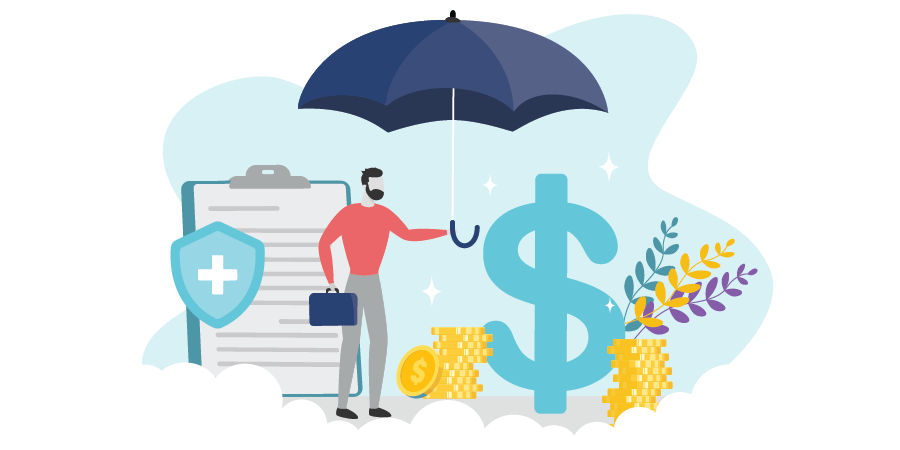Protect Your Income with Disability Insurance
May 2, 2022

When asked to name your most valuable assets, your home or your car may come to mind immediately. But what if we told you that your greatest asset of all might not even be something tangible? It’s your ability to work and earn a living. Think about it: your total earning potential over the course of your life is worth much more than any single asset you own since it’s what allows you to pay for them in the first place.

You probably have insurance to protect both your home and your car—but what about protecting your potential earnings? If an unexpected accident or illness were to prevent you from being able to work, how long would your savings last you? How would you continue to support yourself? That’s where Disability Insurance comes in.
What is Disability Insurance?
Disability Insurance provides a replacement for your income when you’re unable to work because of an injury or illness. In essence, it protects your income—it works when you can’t. If you sustain a qualifying injury or illness that affects your ability to work, you can file a claim with your insurance company for a monthly benefit that’ll provide financial assistance for you and any loved ones who depend on your income.
If your Disability Insurance premiums are paid with after-tax income, the benefit payable won’t be considered taxable income. Monthly payments will typically replace 60-85% of your income prior to disability, and will continue until the end of the benefit period specified in your policy or until you’re able to return to work, if possible. These benefits can be used however you see fit, whether to cover medical expenses or monthly bills, such as mortgage or childcare payments.
Keep in mind though: different policies may define disability in different ways. For example, some of the more comprehensive policies are designed to pay benefits if your disability allows you to work at a lower income and/or at reduced hours—while others may leave you less protected because they won’t pay out if you’re able to work at all, even if you’re earning less than you did before.
RELATED: The 5 W’s (and H) of Disability Insurance
Key Disability Insurance Terms:
There are certain terms that are used when speaking about Disability Insurance that are essential for you to understand:
- Benefit or Benefit Amount: The monthly payment that you’ll receive from your insurance coverage if you have a qualifying disability that prevents you from working.
- Benefit Period: The maximum number of months or years that the Benefit or Benefit Amount will be paid provided you qualify for the disability payments for that entire duration.
- Waiting Period or Elimination Period: The number of days or months that you must wait after you become disabled before the first benefit amount is issued to you.
Are there different types of Disability Insurance?
There are two categories of Disability Insurance: Group or Individual. What’s the difference? We’ll break it down for you.
1. Group Disability Insurance
Group Disability Insurance is typically obtained through your employer, or through associations such as university alumni or professional occupations. As the word “group” implies, the products are designed and priced for a specific group or class of individuals. The amount of coverage you’re eligible for will depend on the plan in place as well as your annual salary, since the benefits amounts will usually not exceed 85% of your monthly income.
A group policy will typically offer both Short-Term Disability Insurance (STD) and Long-Term Disability Insurance (LTD). Here are the key characteristics of each coverage:
Short-Term Disability Insurance
- Designed to support you through recovery from a temporary injury or illness;
- Benefits usually last 3-6 months;
- Shorter waiting period of up to a few weeks before receiving benefits—or no waiting period at all
Long-Term Disability Insurance
- Designed to support you through an extended injury or illness, or a permanent disability;
- Benefits last up to a set number of years or until you reach a certain age;
- Longer waiting period of up to a few months before receiving benefits
Having both short-term and long-term disability coverage provides you with continuous protection that begins as soon as possible after sustaining a serious injury or illness. While long-term disability will support you for an extended period of time, STD will help cover any expenses during the initial stages, before your waiting period for LTD has finished.
Disability Benefit Payments: Taxable Income or Non-Taxable?
If your employer pays the premiums for you from employee benefit credits or if they’re deducted from your gross income, then the benefit amounts if paid to you will be considered taxable income.
If your premiums are paid from your net income (either through payroll deduction or from your bank account), then benefit payments will not be considered taxable.
Most employers will deduct your Disability Insurance premiums from your net income so you won’t have to incur taxes on the disability benefit payments if you become disabled.
2. Individually Owned Disability Insurance
As the name suggests, Individually Owned Disability Insurance is coverage that you buy on your own, either directly from an insurance company or through a licensed life insurance broker. Individually Owned Disability also doesn’t have the two types of coverage found with Group Disability—only long-term disability is available.
One of the advantages of an individual policy is that you’ll have the opportunity to personalize coverage to fit your specific needs, including the ability to determine the length of the waiting period and the benefit period.
In general, the shorter the waiting period and the longer the benefit period, the higher your premium will end up costing.
Which type of Disability Insurance is right for me?
The right type of coverage for you will depend on your needs—your family, lifestyle, and your budget. But even if your employer provides you with Disability Insurance, it’s still worth thinking about getting your own private plan since it will continue to protect you regardless of any changes in your employment status. Plus, not only will a personal policy integrate with your existing group plan to supplement your monthly benefits, but you’ll be able to customize it to bridge any gaps that exist in your employer’s plan.
If you’re not sure what makes the most sense for your needs, we recommend consulting with a licensed life insurance broker—like PROLINK—who can review different coverages with you, and explain the features and gaps in the coverages.
RELATED: What’s an Insurance Broker, Anyway?
Why do I need Disability Insurance?
Anyone who relies on a paycheque should consider getting Disability Insurance, especially if you’re contributing significantly to your household income, paying off large debts, working in a more injury-prone profession, or as a self-employed contractor with no access to group benefits via an employer.
Without your usual income, it would only be a matter of time before you started running low on funds, whether you have dependents or not. On top of all your usual living expenses, you might even incur additional costs related to your injury or illness, such as medications, medical equipment, or medical services like physiotherapy, massage therapy, and chiropractic.
RELATED: How “free” is Canadian healthcare?
How can we help you?
Life is unpredictable. You never know what might happen in the future, and it pays to be prepared. Invest in Disability Insurance and you’re getting the peace of mind that your income will be protected in case of the unexpected.
With so many options out there, PROLINK can help guide you to the solution that fits your needs and your budget. Connect with us today to learn more!
PROLINK’s blog posts are general in nature. They do not take into account your personal objectives or financial situation and are not a substitute for professional advice. The specific terms of your policy will always apply. We bear no responsibility for the accuracy, legality, or timeliness of any external content.




